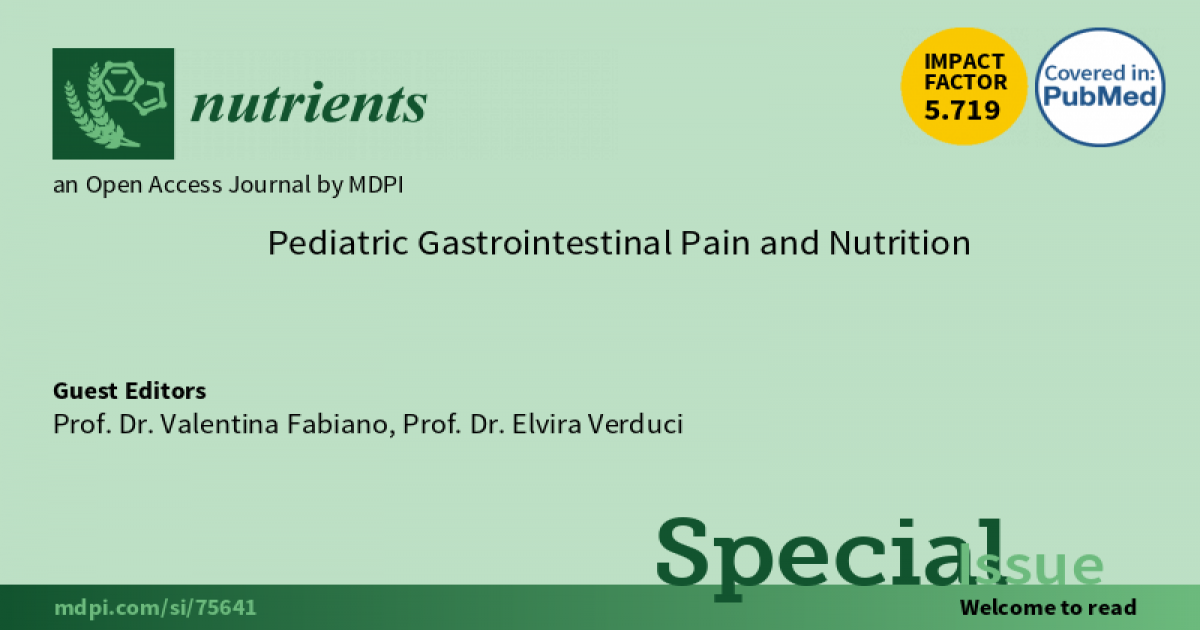Pediatric Gastrointestinal Pain and Nutrition
A special issue of Nutrients (ISSN 2072-6643). This special issue belongs to the section "Pediatric Nutrition".
Deadline for manuscript submissions: closed (31 October 2021) | Viewed by 31833

Special Issue Editors
2. Department of Pediatrics, Vittore Buzzi Children’s Hospital, 20154 Milan, Italy
Interests: pediatrics; nutrition; probiotic; prebiotics; gut microbiota
Special Issues, Collections and Topics in MDPI journals
Interests: pediatrics; early nutrition; congenital metabolic diseases; childhood obesity; infant nutrition
Special Issues, Collections and Topics in MDPI journals
Special Issue Information
Dear Colleagues,
Abdominal pain is a frequently observed symptom in infants and children and may be present in different disorders and conditions.
Dietary pattern may act through different pathways in both pathogenesis and treatment of different gastrointestinal conditions. In the inflammatory bowel syndromes, certain foods or specific nutrients may be involved in the inflammatory process, whereas some others may have a protective role. Diet is the mainstay of the treatment of food allergies, celiac disease, and gluten sensitivity. In functional abdominal pain, most of patients, including children and adolescents, tend to modify their dietary patterns considering that symptoms exacerbate with eating, and specifically with the intake of some specific foods.
Gut dysbiosis, associated with westernized diet, had been demonstrated to have a role in a number of gastrointestinal conditions and interventions through the diet, probiotic, prebiotic, postbiotic or symbiotic supplementation are being extensively studied.
Moreover, in conditions characterized by abdominal pain, there is frequently the need to study the nutritional status of patients and to establish a nutritional follow-up, not only for achieving resolution of signs and symptoms but also for avoiding nutritional imbalances. Nutrition has a long-lasting impact on the health of children with gastrointestinal disorders.
In this Special Issue of Nutrients, we would like to bring together manuscripts dealing with the topic of “Pediatric gastrointestinal pain and nutrition”. Topics may vary and include dietary interventions with foods or specific dietary patterns, food supplements or intervention on the gut microbiome, but also nutritional status evaluation and follow-up of pediatric patients with gastrointestinal disorders. Different types of manuscripts, including original clinical research articles and up-to-date reviews are welcome.
Prof. Dr. Valentina Fabiano
Prof. Dr. Elvira Verduci
Guest Editors
Manuscript Submission Information
Manuscripts should be submitted online at www.mdpi.com by registering and logging in to this website. Once you are registered, click here to go to the submission form. Manuscripts can be submitted until the deadline. All submissions that pass pre-check are peer-reviewed. Accepted papers will be published continuously in the journal (as soon as accepted) and will be listed together on the special issue website. Research articles, review articles as well as short communications are invited. For planned papers, a title and short abstract (about 250 words) can be sent to the Editorial Office for assessment.
Submitted manuscripts should not have been published previously, nor be under consideration for publication elsewhere (except conference proceedings papers). All manuscripts are thoroughly refereed through a single-blind peer-review process. A guide for authors and other relevant information for submission of manuscripts is available on the Instructions for Authors page. Nutrients is an international peer-reviewed open access semimonthly journal published by MDPI.
Please visit the Instructions for Authors page before submitting a manuscript. The Article Processing Charge (APC) for publication in this open access journal is 2900 CHF (Swiss Francs). Submitted papers should be well formatted and use good English. Authors may use MDPI's English editing service prior to publication or during author revisions.
Keywords
- gastrointestinal pain
- nutrition
- nutritional status
- inflammatory bowel diseases
- irritable bowel syndrome
- celiac diasease
- food allergies
- microbiome
- dietary pattern
- probiotics
- prebiotics
- postbiotics
- synbiotics
- intestinal microbiota influencing formula
Benefits of Publishing in a Special Issue
- Ease of navigation: Grouping papers by topic helps scholars navigate broad scope journals more efficiently.
- Greater discoverability: Special Issues support the reach and impact of scientific research. Articles in Special Issues are more discoverable and cited more frequently.
- Expansion of research network: Special Issues facilitate connections among authors, fostering scientific collaborations.
- External promotion: Articles in Special Issues are often promoted through the journal's social media, increasing their visibility.
- Reprint: MDPI Books provides the opportunity to republish successful Special Issues in book format, both online and in print.
Further information on MDPI's Special Issue policies can be found here.







